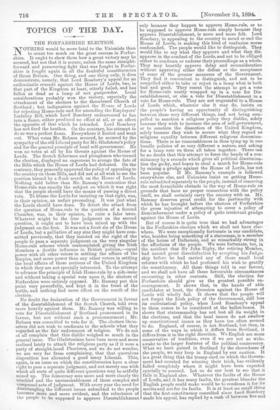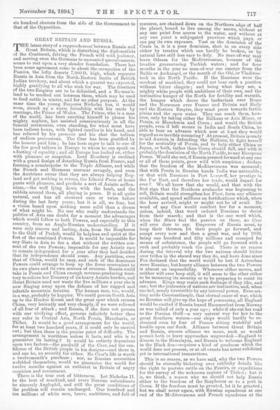TOPICS OF THE D.A.Y.
THE FORFARSHIRE ELECTION. NOTHING would be more fatal to the Unionists than to count too much on the great success in Forfar- shire. It ought to show them how a great victory may be secured, but not that it is secure, unless the same straight- forward and persevering fight that was fought in Forfar. shire is fought again in all the doubtful constituencies of Great Britain. One thing, and one thing only, it does demonstrate, namely, that Lord Rosebery's appeal for an enthusiastic crusade against the House of Lords, has, in that part of the Kingdom at least, utterly failed, and has fallen as dead as a lump of wet gunpowder. Local considerations probably won the victory, especially the attachment of the electors to the threatened Church of Scotland ; but indignation against the House of Lords for rejecting Home-rule and for amending the Employers' Liability Bill, which Lord Rosebery endeavoured to fan into a flame, either produced no effect at all, or an effect the opposite of that which he intended. Lord Rosebery has not fired the heather. On the contrary, his attempt to do so was a perfect fiasco. Everywhere it fizzled and went, out. What votes Mr. Robson secured, he secured by the sympathy of the old Liberal party for Mr. Gladstone's policy and for the general principle of local self-government. He won no votes at all by his threats against the House of Lords. The Scotch fishermen and ploughmen who turned the election, displayed no eagerness to avenge the fate of the Bills which the House of Lords bad defeated. On the contrary, they generally approved the policy of appealing to the country on those Bills, and did not at all wish to see the position turned by a flank march on the House of Lords. Nothing told better than Mr. Ramsay's contention that Home-rule was exactly the subject on which it was right that the people should have the means of passing a direct vote. To blame the Lords for insisting on that right, was, in their opinion, an unfair proceeding. It was just what the Lords should have done. To divert the attack from the question of Home-rule to the question of a Second Chamber, was, in their opinion, to raise a false issue. Whatever might be the true judgment on the second question, it ought not to have been mixed up with the Judgment on the first. It was not a fresh sin of the House of Lords, but a palliation of any sins they might have com- mitted previously, that they insisted on the right of the people to pass a separate judgment on the very singular Home-rule scheme which contemplated giving the Irish Members a double influence in British politics,—equal power with all other voters in settling the affairs of the Empire, and more power than any other voters in settling the local affairs of those sections of the United Kingdom in which they are not specially interested. To the attempt to advance the principle of Irish Home-rule by a side-issue and without taking a special vote upon it, the electors of Forfarshire were entirely opposed. Mr. Ramsay put this point very powerfully, and kept it in the front of the battle, and nothing had more effect on the result of the election.
No doubt the declaration of the Government in favour of the disestablishment of the Scotch Church, told even more heavily against them. Mr. Ramsay was willing to vote for Disestablishment if Scotland pronounced in its favour, but not without such a pronouncement ; Mr. Robson was committed to vote for it. The electors them- selves did not wish to confiscate to the schools what they regarded as the fair endowment of religion. We do not at all complain that this dislike weighed so much in the general issue. The Gladstonians have been more and more inclined lately to attack the religious party as if it were a party of straight-laced Pharisees, and we do not wonder, we are very far from complaining, that that querulous disposition has alienated a good many Liberals. This, again, is an issue on which the constituencies have a clear right to pass a separate judgment, and not merely one with which all sorts of quite different questions may be artfully mixed up. The democracy sees more and more clearly the mischief and the unreasonableness of these complex and compound acts of judgment. With every year the need for disentangling the different issues submitted to the people becomes more and more evident, and the reluctance of the people to be supposed to approve Disestablishment only because they happen to approve Home-rule, or to. be supposed to approve Home-rule simply because they approve Disestablishment, is more and more felt. Lord Rosebery, in appealing to the country to mend or end the House of Lords, is making this kind of confusion worse, confounded. The people would like to distinguish. They would like to say what they approve and what they die; approve in the conduct of the Lords, and not to be obliged, either to condemn or endorse their proceedings as a whole. They may heartily approve delay and reconsideration without approving either the defeat or the acceptance of some of the greater measures of the Government. They find it convenient to distinguish, and not to be compelled either to take or reject in a lump what is both bad and good. They resent the attempt to get a vote for Home-rule neatly wrapped up in a vote for Dis- establishment, or else a vote for Disestablishment in a vote for Home-rule. They are not ungrateful to a Houser of Lords which, whatever else it may do, insists on the people's having an opportunity of distinguishing- between these very different things, and not being com- pelled to sanction a religious policy they dislike, solely because they wish to increase the area of self-government, or to sanction the dissection of the United Kingdom, solely because they wish to secure what they regard as religious equality between different religious denomina- tions. There is no reasonableness in thus tying up in one bundle policies of so very different a nature, and asking- for a lump vote on them all taken together. There can be no doubt that this attempt to force the hands of a con- stituency by a crusade which gives all political discrimina- tion the go-by, and hopes to steal a march for Home-rule by raising a grudge against the House of Lords, has not been popular. If Mr. Ramsay's example is followed everywhere else, and Unionists insist on getting Home- rule submitted separately to the people, instead of removing the most formidable obstacle in the way of Home-rule on. grounds that have no proper connection with the policy itself, we shall certainly carry the country with us. Mr. Ramsay deserves great credit for the pertinacity with which he has brought before the electors of Forfarshire the gross injustice of attempting to cover a policy of dismemberment under a policy of quite irrelevant grudge against the House of Lords.
But of course it is quite true that we had advantages in the Forfarshire election which we shall not have else- where. We were exceptionally fortunate in our candidate, who, besides being something of a statesman, is a member of the house of Dalhousie, and so remarkably strong in the affections of the people. We were fortunate, too, in the accident that Sir John Rigby, the retiring Member, had caused great dissatisfaction by accepting his Judge- ship before he had carried any of those small local reforms with which he had professed his wish to gratify the constituency. All these things told in our favour, and we shall not have all these favourable circumstances concurring in other contests. Still, the election for Forfarshire should give us the greatest possible en- couragement. It shows that, in the hands of able candidates at least, the diversion against the House of Lords will wholly fail. It shows that the people will not forget the Irish policy of the Government, still less its ecclesiastical policy, when Lord Rosebery's appeal to them comes to be considered at the ballot-boxes. It shows that statesmanship has not lost all its weight in the elections, and that the local issues do not swallow up constitutional issues as they have too often seemed to do. England, of course, is not Scotland, but then, in some of the ways in which it differs from Scotland, it differs from it in the right direction. We English are more conservative of tradition, even if we are not so wide- awake to the larger features of the political controversy. What we have gained in Scotland by the shrewdness of the people, we may keep in England by our caution. It is a great thing that the trump-card on which the Govern- ment had counted for winning their trick, has evidently failed completely where it might have been expected specially to succeed. Let us do our best to see that it fails in England also. Whatever the faults of the House of Lords, and it has many faults, the greatest blunder the English people could make would be to condemn it for its merits and not for its faults. It is at least no small thing that the first constituency consulted since Lord. Rosebery made his appeal, has replied by a rush of between five and six hundred electors from the lac of the Government to that of the Opposition.







































 Previous page
Previous page